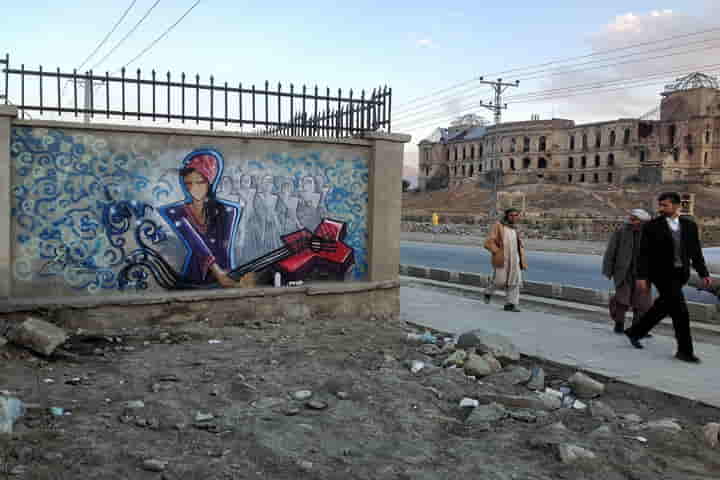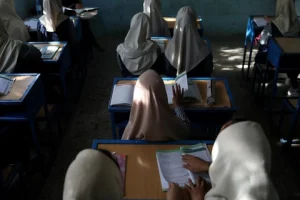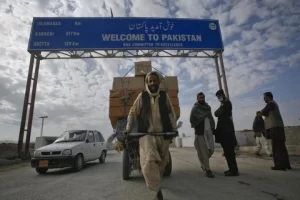There is a sense of deep anguish and betrayal among the artists and those dedicated to creative arts in Afghanistan as the Taliban takes over the reign of the country following the withdrawal by the United States.
Aware of Taliban’s bigoted views about art and culture, artists feel let down at being simply handed over to them without any qualms. In an article in dw.com, Germany-based Laila Noor, a fashion designer and an Afghan women’s activist, made an interesting observation: "One needs to be sensitive and ask, what is important for the people of this country? These barbarians do not have anything to do with the arts and culture, but other people in Afghanistan do. It is these people who need support and security and who should not be simply delivered to those who have no respect for the arts, culture or women.”
World over Afghan cultural figures and artists are asking questions which are difficult as they seek accountability from US and the Western nations for their actions and its impact on Afghanistan.
Also read: Young Afghan pianist Arson Fahim says musicians are afraid of Taliban and hiding instruments
Author of best-selling works like “The Kite Runner” and “A Thousand Splendid Suns”, Kabul-born Khaled Hosseini, expressed his sadness in writing to dw.com about developments in Afghanistan. He stated that he was "deeply disappointed and gravely concerned for the country”.

Well known author Khaled Hosseini
Hosseini remarked: "The US and the international community at large must take steps to prevent a humanitarian crisis in Afghanistan. They must exert pressure on the Taliban to respect the essential human rights of Afghans, particularly women and girls, and to refrain from using violence against Afghan citizens.”
The fear factor is palpable in the air as various artists and filmmakers had gone into hiding and were taking their work off the internet. They were avoiding talking to the media and giving interviews.
Shamayel Pawthkhameh Shalizi, a Berliner and an Afghan designer, told DW: “I'm hearing a lot of panic, fear, resurgence of the PTSD (post-traumatic stress disorder) of the people who have lived through Taliban time before.” She added poignantly that it is perceived by the Afghans as "regression to a time that they never thought would come back again.”
Making a reference to the claims by Taliban recently giving an impression of change, she said: "Even though they quote to be 'different' now, it's not a safe place to be an artist right now, both if you continue to create art as well as if you were creating art these 20 years of no Taliban. These are very vulnerable communities, artists specifically and especially the artists who are from even more marginalized communities.”
Also read: Will Afghanistan's heritage marvels survive a resurgent Taliban?
The Germany-based designer has gathered that her friends who are musicians in Afghanistan have started dismantling their studios and keeping everything in hiding.
She is also aware of others, who unmindful of the Taliban continue with their work. It is a form of resistance, doing music or graffiti in the Capital "as a swan song” and their last act before they go underground and into hiding.
For those artists who took risk to criticise and portray Taliban negatively, the risk has increased manifold, remarked Shalizi. Yet, Taliban views art itself as a threat.
Well-known Afghan filmmaker Sahraa Karimi who has managed to escape from Afghanistan has in an open letter said: "If the Taliban take over, they will ban all art. I and other filmmakers could be next on their hit list.” This letter was widely circulated on social media.

Afghan filmmaker Sahraa Karimi
According to Noor, the oppression has already started. Institutions dealing in education have been shut down and women and girls as abundant caution are not going out. Her organization Afghanistan Women's Network runs several schools in underprivileged areas in Afghanistan.
Not buying Taliban’s new makeover, Noor feels that like their reign in the past, they will remain silent and quiet for the first six months, which is required for international aid to come in. After that will commence the subjugation of rights.
Making a pertinent observation Noor said: "Twenty years ago, the Taliban shut all schools, girls were forbidden from going to school, women couldn't go to work, they were whipped, they were stoned, they were raped. The world kept watching. It's the same Taliban.”
Giving vent to her genuine anguish Noor added: "I don't know what kind of people they are. They kill women and they have been brought into this world by a woman. They have no respect for their sisters, mothers, and art and culture is anyway a sin. Twenty years ago they destroyed our world heritage in Bamiyan.”
Also read: Fate of Afghanistan’s ancient heritage hangs in balance as Taliban takes over
The pain of being left to fend on their own is evident as she said that when nations came together two decades back to help Afghanistan, then they should have found an international solution and not left them in the lurch. She summed up succinctly: "Please understand the disappointment, the pain and the anger that Afghans carry within themselves.”




















